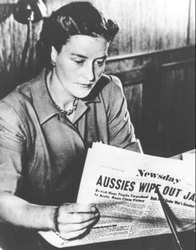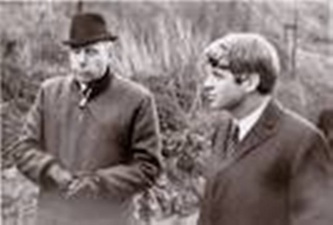|
The year is full of fiftieth anniversaries, including the March on Washington and the terrible event coming up on Nov. 22.
Two other milestones are worth noting: the publication of a landmark book about Appalachia and the death of a landmark publisher. I got to meet Harry Caudill and Alicia Patterson, two strong-minded patricians. As a young sports reporter at Newsday on Long Island, I was aware of the publisher, with the tone of the country club and the vocabulary of a press room. She was descended from the newspaper family of McCormicks and Medills and Pattersons, and in 1939 she had been given a newspaper by her wealthy husband, Captain Harry F. Guggenheim. It was her toy, and she turned it into a great newspaper. You could hear her down the hall, conducting business with her editors, a presence -- jewelry glittering, glasses perched on her forehead. The boss. Miss P. I don’t claim to know what she did and said. I only know that all of us took energy from her. At Christmas parties, Stan Brooks – the same whirlwind reporting from the street for WINS radio today – used to don dress, glasses, stockings and high heels for a fantastic takeoff of Miss P, who loved it. You can read all about Alicia Patterson via her foundation: http://aliciapatterson.org/alicia-patterson The final praise for her is from Jack Mann, the irascible sports editor who gave me a career. Jack got himself fired in the summer of 1962 after a dispute with a managing editor while Miss P was out grouse-hunting or something. When she came back, she told Jack she could not countermand her editor. I never heard him badmouth her for that. A year later Miss P died during surgery for ulcers, at 56. The paper had glory years after her time, including the great run of New York Newsday, but it is now run by the Dolans. Some of us think it would never have slipped this way if Miss P had lived a few more decades. Harry Caudill’s voice reached the big cities, all the way from Whitesburg, Ky., where he was a lawyer. In 1963, he wrote a lament called Night Comes to the Cumberlands, about the colonization of Appalachia, where coal lay under the surface. His book made me care for Appalachia; seven years later I went to cover it for the New York Times. Things were about as bad as he said, but I was captivated by it. I got to meet Caudill, who goaded me to spend more time in the mountains. When A.M. Rosenthal, the great editor of the Times, was making a tour of the region in 1971, we had a nice lunch with the Caudills, who had the ear of the paper. The next summer Caudill called the home office to say an entire mountain had shed its coal slag, known as red dog, into a community. I was dispatched from vacation at Jones Beach to a bare-bones motel in Whitesburg, by which time a few families had raked the stuff out of their yards. Caudill saw disasters large and small, standing up to politicians who served the coal industry. He suffered from a war injury, and came down with Parkinson’s Disease, and committed suicide in 1990 at the age of 68, in his yard, facing Pine Mountain. http://www.kentucky.com/2012/12/23/2452306/chapter-5-harry-caudill-inspired.html By that time, I had written a book about a radical miner in southwest Virginia called, “One Sunset a Week.” Caudill’s book is still the most important book about Appalachia. Fifty years later. (Alicia Patterson, reading her paper; Harry Caudill tutoring a visitor, Robert F. Kennedy, who paid attention, who cared.)
Ed Martin
11/9/2013 02:57:15 am
Alicia Patterson captured the changing nature of Long Island. Thousands of families, most veterans in the 1947-50 era, moved from NYC to LI, Levittown was a big draw. I was selling The Nassau Daily Review Star, 13 week subscriptions. Newsday offered me a better job, at 16 a tough decision. I made so much money my father lost his tax deduction. Families would tell me the read "The News" or "The Mirror" or any of the seven dailies, and I would tell them about grocery ads, schools, movies, taxes, etc. News day became ubiquitous and the Review Star shrank into a minor, Southshore presence. The writers were lively, even great investigative stories.
George Vecsey
11/9/2013 05:14:04 am
The Newsday deliverer vanished when Newsday became a morning paper...It was an institution. Our son delivered them in our town.
Charlie Accetta
11/16/2013 05:31:36 am
GV - I don't presume to know anything about the two people in this essay, except what you choose to tell us. That is your prerogative. They both died before their time, one on the operating table and the other from a self-inflicted gunshot. You have effectively conveyed a sense of loss in the telling.
George Vecsey
11/17/2013 05:15:44 am
Charlie, I appreciate your insights. I was just a kid reporter when Miss P died, and I met Caudill only 3-4 times although he monitored me pretty carefully. I have no sense of the backgrounds to the deaths of these two people, except that Caudill was definitely stricken with Parkinson's. The linked article says he did not want to be a burden to his family. A mountain person's solution? I can't judge. I try to be aware of alcohol as a factor in life, from the book I did with Bob Welch 30 years ago, about his drinking while pitching for the Dodgers. He continues to teach me a lot about awareness, day by day. In regard to these two productive lives, I have no clue. Thanks for raising an important issue. GV 2/11/2015 04:41:55 pm
yes, it is a good topic. I learned many things from it! Comments are closed.
|
Categories
All
|











